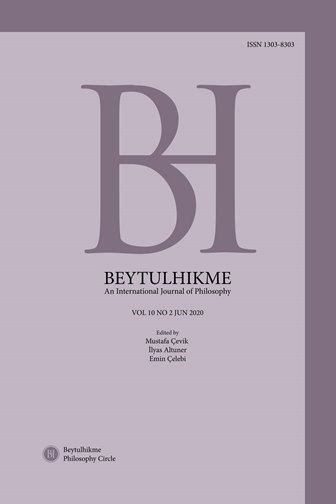Ernst Mach’ın Anti-Realizminin Fenomenalist Temeli ve Öznel İdealist Sonucu: Mach Solipsist Bir Düşünür Olabilir mi?
Author :
Abstract
Bu makalede ilk olarak Ernst Mach’ın atomun varlığına ilişkin itirazının temelini oluşturan ve bilimin sadece gözlemlenebilir olgulara dayandırılması gerektiği yönündeki düşüncelerini ortaya koyan anti-realist ya da enstrümantalist görüşlerine yer verilmektedir. Ardından Mach’ın enstrümantalist tavrının alt metninde bulunan ve yalnızca duyumları gerçek olarak kabul eden fenomenalist argümanlarının ayrıntıları serimlenecektir. Fenomenalist düşünce atom, molekül ve kuark gibi gözlemlenemeyen varlıkları zihinden bağımsız şeyler olarak değerlendiren realizm düşüncesi ile uyuşmamaktadır. Bu bağlamda yapılan incelemeler, Mach’ın atomu bir düşünce sembolü ya da metafiziksel bir kurgu olarak değerlendirmesine ve dış dünyadaki varlıkların var olmasını, onların bir zihin tarafından duyumsanması koşuluna bağlaması ile sonuçlanmaktadır. Makalede Mach’ın öznel idealizmi olarak ele alabileceğimiz bu argümanlarının radikal bir sonucu olarak onun düşüncelerini solipsizm ile ilişkilendirmenin yanlış olmayacağı sonucuna varılmaktadır.
Keywords
Abstract
This article initially presents Ernst Mach's anti-realist or instrumentalist stance that underpin his opposition to atomism and reveal his idea that science should be based totally on objectively observable facts. Then, the details of Mach's phenomenalist arguments which recognize only sensations as real are revealed. Phenomenalist thought is not compatible with the idea of realism, which evaluates unobservable entities such as atom, molecule and quark as mind-independent things. In this context, Mach considers the atom as a thought symbol or a metaphysical fiction. This results in the idea that the existence of matter or entity is not independent of the perceiving minds, which is considered Mach’s subjective idealism. As a result of these arguments, the article argues that it would not be wrong to associate Mach's thoughts with solipsism, a radical form of subjective idealism.
Keywords
- Arens, K. (2012). Structures of Knowing: Psychologies of the Nineteenth Century (Vol. 113). Dordrecht: Kluwer Academic Publishers.
- Aristoteles (1996). Metafizik. (Çev. A. Arslan). İstanbul: Sosyal Yayınlar.
- Bächtold, M. (2010). Saving Mach’s View on Atoms. Journal for General Philosophy of Science, 41 (1), 1-19.
- Berkeley, G. (1996). İnsan Bilgisinin İlkeleri Üzerine. (Çev. H. Turan). Ankara: Bilim ve Sanat Yayınları.
- Bernstein, J. (1983). Ernst Mach and the Quarks. American (The) Scholar Washing- ton, DC, 53 (1), 7-14.
- Blackmore, J. T. (1992). Ernst Mach- A Deeper Look: Documents and New Perspecti- ves (Vol. 143). Dordrecht: Kluwer Academic Publishers.
- Brush, S. G. (1968). Mach and Atomism. Synthese, 18 (2-3), 192-215.
- Capelle, W. (2011). Sokrates’ten Önce Felsefe. (Çev. O. Özügül). İstanbul: Pencere Yayınları.
- Cathcart, H. (1964). Berkeley's Philosophy through Soviet Eyes. Hermathena, 98, 33-42.
- Hickey, T. J. (2005). History of Twentieth-Century Philosophy of Science: Ernst Mach and Pierre Duhem on Physical Theory. Thomas J. Hickey.
- Hume, D. (2009). İnsan Doğası Üzerine Bir İnceleme. (Çev. E. Baylan). Ankara: Bil- geSu Yayıncılık.
- Ladyman, J. (2002). Understanding Philosophy of Science. London and New York: Routledge.
- Locke, J. (2013) İnsan Anlığı Üzerine Bir Deneme. (Çev. V. Hacıkadiroğlu). İstanbul: Kabalcı Yayınevi.
- Mach, E. (1959). The Analysis of Sensations and the Relation of the Physical to the Psychi- cal. (Trans. C. M. Williams). New York: Dover Publications.
- Mach, E. (1976). Knowledge and Error: Sketches on the Psychology of Enquiry. Dordrecht: Reidel.
- Mach, E. (1960). The Science of Mechanics: A Critical and Historical Account of Its Development. (Trans. T. J. McCormack). La Salle, IL: Open Court.
- McNulty, T. M. (1982). James, Mach, and the Problem of Other Minds. Transactions of the Charles S. Peirce Society, 18 (3), 244-254.
- Merriam-Webster Dictionary (2020). Empiriocriticism. Erişim: 16.04.2020. https://www.merriam-webster.com/dictionary/empiriocriticism.
- Musgrave, A. (1993). Common Sense, Science and Scepticism: A Historical Introduction to the Theory of Knowledge. Cambridge: Cambridge University Press.
- Okasha, S. (2016). Philosophy of Science: Very Short Introduction. Oxford: Oxford University Press.
- Pittenger, H. (1965). Ernst Mach: Biographical Notes. Science, 3700, 1120-1122.
- Sharvy, R. (1983). Aristotle on Mixtures. The Journal of Philosophy, 80 (8), 439-457.
- Stadler, F. (1992). The “Verein Ernst Mach”: What Was It Really? Ernst Mach: A Deeper Look. (Ed. J. Blackmore). Dordrecht: Springer, 363-377.
- Woods, A. & Grant, T. (2011). Aklın İsyanı: Marksist Felsefe ve Modern Bilim. (Çev. U. Demirsoy & Ö. Gemici). İstanbul: Tarih Bilinci Yayınları.
- Yardımcı, A. (2015). Metafizik ve Epistemolojik Solipsizm Üzerine Eleştirel Bir İnceleme. Mavi Atlas, 4, 190-200.
- Yourgrau, P. (2005). A World without Time: The Forgotten Legacy of Gödel and Eins- tein. New York: Basic Books.





